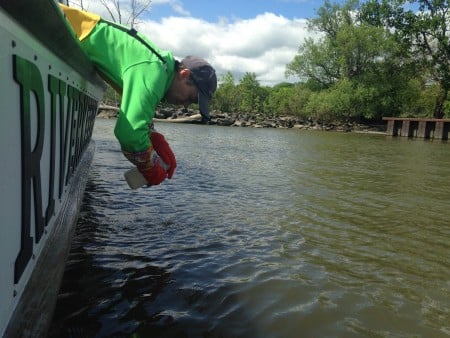Work to stop flow of sewage into Hudson from Newburgh continues
Newburgh is continuing to make progress eliminating discharges of untreated sewage directly to the Hudson River.
In May 2014, Riverkeeper publicized data that suggested sewage was escaping Newburgh’s combined sewer system even in dry weather. That ultimately prompted a high-impact investigation in November 2015 that identified an entire neighborhood on the city’s north side that had been discharging its sewage directly to the river, rather than to the city’s treatment plant.

Carol Knudson, of Lamont-Doherty Earth Observatory, grabs a water sample from the Riverkeeper patrol boat at Newburgh’s public boat launch.
As that investigation has continued, the City has recently identified several properties whose pipes connect directly to the Hudson via the city’s combined sewer overflows, including a warehouse under renovation, and a single-family home.
The state is paying for the city to oversee this work, with an Engineering Planning Grant from the state Clean Water State Revolving Loan Fund. Riverkeeper is advocating for increases to key funding sources for reducing the flow of sewage into our waters, including $800 million for the Water Infrastructure Improvement Act, and $300 million for the Environmental Protection Fund, with sustained funding for the Water Quality Improvement Programs, which provide grants to communities like Newburgh to invest in sewer repairs and improvements. The money spent stops pollution, as these results show.
The city still faces a big challenge in controlling sewage overflows after it rains. It agreed in February 2016 to a long term control plan that will, over 15 years, reduce oveflows by 100 million gallons per year.
Stopping illicit connections between the sewer and stormwater systems will restore water quality in dry weather. Keep up the good work, Newburgh.
